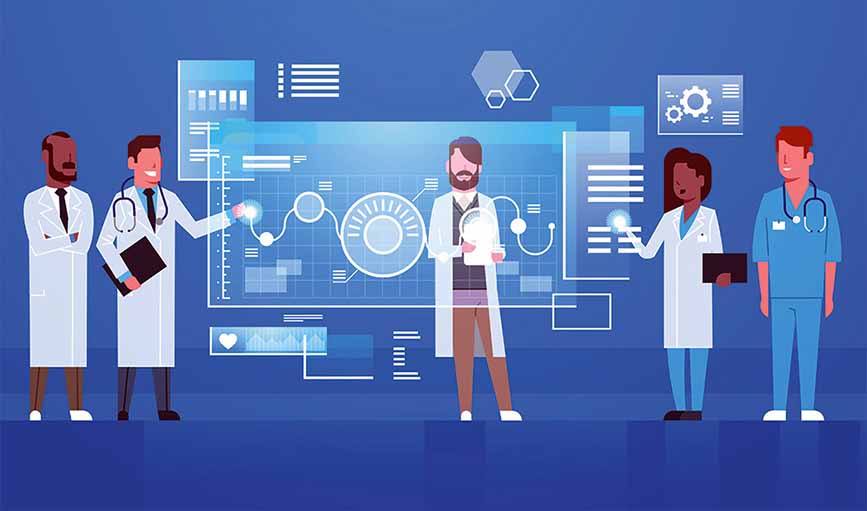Healthcare industry has been drastically changed and improved with technological innovation and advances. With the use of new healthcare tech trends, the environment of healthcare institutions and hospitals has become fast-paced and patient-friendly. Modern healthcare innovation has offered a variety of solutions for both care providers and patients.
Software development companies and agencies are putting in their efforts to bring better technology in the field of healthcare. Many software advancements including digital diagnostics, wearables, sensors, m-health, cloud-portal data, self-service kiosks and telemedicine have broadened the range of medical relate d software solutions. Moreover, with modern technological advancement, geographical barriers are broken up. Now, it has become possible to deliver remote medical care to the patients located in distant areas.
Considering this, the healthcare industry is moving forward to bring change in the lifestyles of millions of people. based on the progress in recent years, we are anticipating to see significant improvements in the healthcare industries in a few upcoming years. With the rise of artificial intelligence, IoT and IoMT, bots, data science and augmented and virtual reality in healthcare domains, a significant impact of technological advancement in the clinical sector has hit the ground running.
Table of Contents
Artificial Intelligence and the healthcare sector
Artificial intelligence is becoming a popular choice for transforming software development solutions, and the top-notch software development companies are leveraging artificial intelligence to program better software. Artificial intelligence has been deployed in multiple ranges of services and areas, and healthcare is a major name. in a healthcare institution, AI is capable of replacing a large area of the human workforce. It can automate the routine tasks including paperwork, accounting, scheduling and timesheet entry. With artificial intelligence, health workers are enabled to work fast, effortlessly, efficiently, and flawlessly.
AI analytics help to identify and solve the potential issues and concerns in the healthcare domains. It enables the staff and practitioners to unfold a new way and approach for treatment.
Machine learning algorithm helps in the safe examination and utilization of chemicals and equipment in the process of drug discovery. AI has proven to be extensively useful in the research processes and has put forward to be among the most effective discoveries in healthcare .
The Rise of Bots in Healthcare
A wide majority of healthcare staff has conventionally been occupied to the routine check-ups and inquiries. This makes a difficult, laborious, and expensive task for the service providers and caretakers. Routine check-ups and inquiries can be made cost-effective and easy by leveraging the help from bots. A number of software development companies are providing chatbots and other healthcare services. Caretakers and patients can make use of personalized healthcare through predictive analytics. Also, the installation has now become an easy and comfortable process for healthcare and other institutions.
Bots have been familiarized in most business verticals, and we soon will see a progressive increase in healthcare bots services. Healthcare bots can be used as a digital assistant that enables healthcare professionals to keep an improved track of appointments and meetings. In addition to this, they can be better able to make changes. Bots are improving the healthcare sector by providing clearer and practical measures for monitoring patient activities.
Data Science & Predictive Analytics
Getting information and exploiting it for bringing improvement and advancement is the key idea of data science and predictive analysis. Data science has made it easy to use the collected information in a profitable way. The predictive analysis makes it easy to unfold the healthcare developmental aspects through Consistent accuracy and improved solutions.
AR/VR in Healthcare
Internet of Medical Things (IoT/IoMT)
Internet of Things (IoT), particularly, IoMT has excessively been productive in revolutionizing inventory management in healthcare spaces including pharmacies and warehouses. This can serve as one of the most effective tools in emergency cases as the doctors and practitioners can provide necessary suggestions and share data that too by staying at their places.
IoT has evolved by combining IoT with telehealth and telemedicine technologies and wearables. Wearables in healthcare can be used when big data is paired with a strong body of clinical evidence. A software development company can make use of digital biomarkers that present an opportunity to translate new data sources into informative, actionable insights for both healthcare institution and its users. IoT has much more to explore and expand in the field of the healthcare sector in the near future. It has many interactive options for providing health care more efficiently.
Tele-medicine
Remote diagnosis and treatment of patients by using telecommunication technologies are referred to as telemedicine. Telemedicine, among other healthcare solutions, is the most easily reached and ubiquitous field which allows doctors to analyze, diagnose and treat patients remotely.
With rapidly increasing care costs, the need for consumer engagement in healthcare has never been this higher. While in rural areas, expert healthcare facilities are not less than a luxury. In such a scenario, telemedicine act as a blessing.
The rise of increased illness and diseased has made public health a global concern. The surge in the number of patients and the appearance of diseases ask for the need of software advancement in healthcare sectors as well. Exceptional medical solutions are the sole consequence of technological advances and a sincere effort of software development companies.








